

Deborah Kerr. Early life[edit] Deborah Jane Kerr-Trimmer was born in a private nursing home (hospital) in Glasgow,[2][3] the only daughter of Kathleen Rose (née Smale) and Capt.
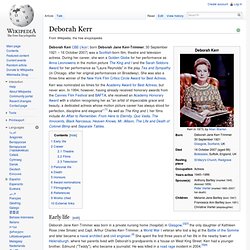
Overview for Deborah Kerr. A gifted, sensitive Scottish-born leading actress, Deborah Kerr landed her breakthrough screen role in 1940 as a frightened Salvation Army worker in the fine, all-star adaptation of the potent Shavian satire, "Major Barbara".

Originally trained for the ballet, she moved into stage acting and gained some experience in British repertory theater before segueing to films. Deborah Kerr: Personal Collection. Deborah Kerr - rhymes with "star" - Home. Deborah Kerr - Obituaries - News. One of the few British actresses to become an internationally successful film star, in 1957 Deborah Kerr was named "The world's most famous actress" by Photoplay magazine.

She had had a highly successful career in British cinema before being poached by Hollywood. Deborah Kerr. The Life and Death of Colonel Blimp. Plot[edit] Boer War In 1902, Lieutenant Candy is on leave from the Boer War.
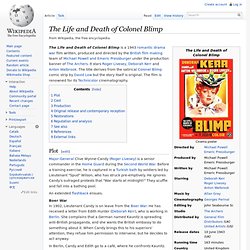
He has received a letter from Edith Hunter (Deborah Kerr), who is working in Berlin. She complains that a German named Kaunitz is spreading anti-British propaganda, and she wants the British embassy to do something about it. When Candy brings this to his superiors' attention, they refuse him permission to intervene, but he decides to act anyway. The Life and Death of Colonel Blimp (1943. Black Narcissus. Black Narcissus achieved acclaim for its pioneering technical mastery, with the cinematographer Jack Cardiff, shooting in vibrant colour, winning an Academy Award for Best Cinematography and a Golden Globe Award for Best Cinematography, and Alfred Junge winning an Academy Award for Best Art Direction.
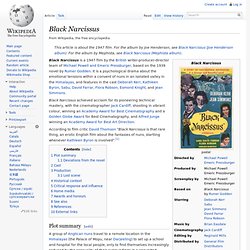
Plot summary[edit] Deviations from the novel[edit] David Farrar as Mr Dean. Black Narcissus (1947. Edward, My Son. Edward, My Son is a 1949 American/British drama film directed by George Cukor that stars Spencer Tracy and Deborah Kerr.
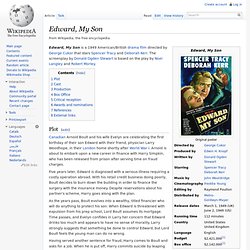
The screenplay by Donald Ogden Stewart is based on the play by Noel Langley and Robert Morley. Plot[edit] Canadian Arnold Boult and his wife Evelyn are celebrating the first birthday of their son Edward with their friend, physician Larry Woodhope, in their London home shortly after World War I. Arnold is about to embark upon a new career in finance with Harry Simpkin, who has been released from prison after serving time on fraud charges. Five years later, Edward is diagnosed with a serious illness requiring a costly operation abroad.
As the years pass, Boult evolves into a wealthy, titled financier who will do anything to protect his son. Having served another sentence for fraud, Harry comes to Boult and asks for a job. Edward, My Son (1949. King Solomon's Mines (1950 film) The party encounters Van Brun (Hugo Haas), a lone white man living with a tribe.
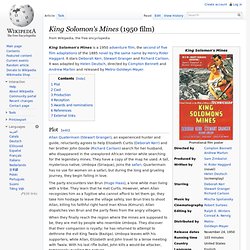
They learn that he met Curtis. However, when Allan recognizes him as a fugitive who cannot afford to let them go, they take him hostage to leave the village safely. Van Brun tries to shoot Allan, killing his faithful right hand man Khiva (Kimursi). Allan dispatches Van Brun and the party flees from the angry villagers. When they finally reach the region where the mines are supposed to be, they are met by people who resemble Umbopa. King Solomon's Mines (1950. Quo Vadis (1951 film) The action takes place in ancient Rome from AD 64–68, a period after Emperor Claudius' illustrious and powerful reign, during which the new corrupt and destructive Emperor Nero ascends to power and eventually threatens to destroy Rome's previous peaceful order.
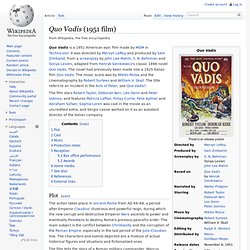
The main subject is the conflict between Christianity and the corruption of the Roman Empire, especially in the last period of the Julio-Claudian line. The characters and events depicted are a mixture of actual historical figures and situations and fictionalized ones. Meanwhile, Nero's atrocities become increasingly more outrageous and his acts more insane. When he burns Rome and blames the Christians, Marcus goes off to save Lygia and her family. Quo Vadis (1951. From Here to Eternity.
The film won eight Academy Awards out of 13 nominations, including for Picture, Best Director (Fred Zinnemann), Adapted Screenplay, Supporting Actor (Frank Sinatra) and Supporting Actress (Donna Reed).[2] The film's title comes originally from a quote from Rudyard Kipling's 1892 poem "Gentlemen-Rankers", about soldiers of the British Empire who had "lost [their] way" and were "damned from here to eternity".
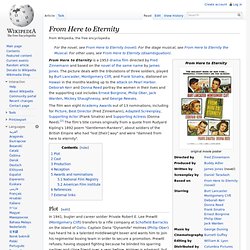
Plot[edit] In 1941, bugler and career soldier Private Robert E. Lee Prewitt (Montgomery Clift) transfers to a rifle company at Schofield Barracks on the island of Oahu. Captain Dana "Dynamite" Holmes (Philip Ober) has heard he is a talented middleweight boxer and wants him to join his regimental boxing team in order to secure a promotion. Prewitt refuses, having stopped fighting because he blinded his sparring partner and close friend over a year before. Holmes makes life as miserable as possible for Prewitt, hoping he will give in. Then Sergeant Galovitch picks a fight with Prewitt. From Here to Eternity (1953. The King and I (1956 film) Strong-willed, widowed schoolteacher Anna Leonowens arrives in Bangkok from Wales with her young son Louis after being summoned to tutor the many children of King Mongkut.
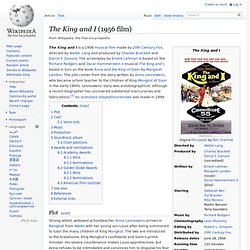
The two are introduced to the Kralahome, King Mongkut's confidante and Siam's prime minister. His severe countenance makes Louis apprehensive, but Anna refuses to be intimidated and convinces him to disguise his fear ("I Whistle a Happy Tune"). The Kralahome explains he has come to escort them to the Royal Palace where they will live – a violation of Anna's contract, which calls for them to live in a separate house outside the walls of the palace. The King and I (1956. Heaven Knows, Mr. Allison. Heaven Knows, Mr. Allison is a 1957 CinemaScope film which tells the story of two people stranded on a Japanese-occupied island in the Pacific Ocean during World War II.
The movie was filmed on the islands of Trinidad and Tobago. Producer Eugene Frenke later filmed a low-budget variation on the story, The Nun and the Sergeant (1962), starring Frenke's wife Anna Sten.[3] Plot[edit] In the South Pacific in 1944, U.S. Heaven Knows, Mr. Allison (1957. The Sundowners. The Sundowners is a 1960 film that tells the story of an Australian outback family torn between the father's desires to continue his nomadic sheep-herding ways and the wife's and son's desire to settle down in one place. The movie stars Deborah Kerr, Robert Mitchum, and Peter Ustinov, with a supporting cast including Glynis Johns, Dina Merrill, Michael Anderson, Jr., and Chips Rafferty.
The Sundowners (1960. Casino Royale (1967 film) Charles K. Casino Royale (1967.